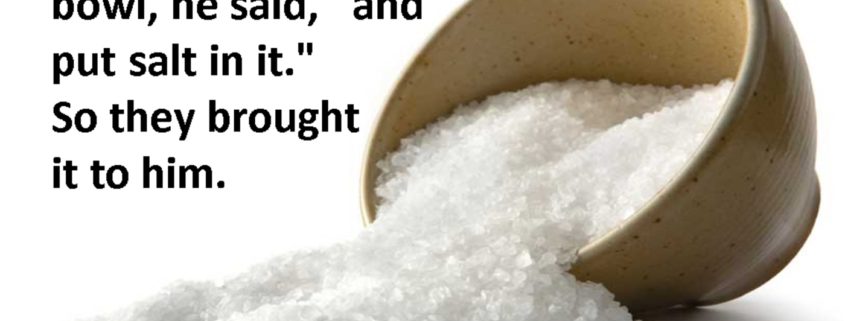THE SHADOW OF SALT IN THE OLD COVENANT
The Old Testament mentions of a prefiguration of the Church’s salty ministry. When Elisha assumes the prophetic ministry of his predecessor, Elijah, he stayed in Jericho for some time. When he was there, the people approached him and said, “’The location of this city is good, as my lord sees; but the water is bad, and the land is unfruitful.’ [Elisha] said, ‘Bring me a new bowl, and put salt in it.’ So, they brought the new bowl to him. He then went to the spring of the water and threw the salt into it, and said, ‘Thus says the Lord, I have made this water wholesome; from now on neither death nor miscarriage shall come from it.’ So, the water has been wholesome to this day, according to the word that Elisha spoke” (II Kgs. 2:18-22 NRSV).
The above narrative has ample typological inferences. Firstly, the fact that the location of the city was good (since the foundations of the city were inherently and naturally good) is a typological instance of humanity’s natural goodness. We are made in God’s image, and are therefore naturally good creations of God; however, because of the Fall of Adam, many consequences are now shared by the whole humankind. This is seen in the people’s complaint, that although the location of the city is inherently good, “the water is bad, and the land is unfruitful.” The preceding passage directs us to the fallen nature of humanity and its need for cleansing and purification, just as the water and land within the city of Jericho needed to be cleansed and purified.
The “new bowl” Elisha requested is a foreshadowing of the New Covenant ushered in by Christ. The author of the Book of Hebrews writes, “There is, on one hand, the abrogation of an earlier commandment because it was weak and ineffectual (for the law made nothing perfect); there is, on the other hand, the introduction of a better hope, through which we approach God,” (Heb. 7:18-19 NRSV). Let’s symbolically correlate the “new bowl” Elisha requested as the new covenant ushered into the world by the ministry of Christ. In this context, we can understand that an “old” bowl would have proven inefficient to purify and cleanse Jericho, and that a “new bowl” was necessary in order to truly restore it so that it may be entirely good.
The waters which Elisha throws the salt in represent the earth, while the salted water itself represents Christ’s followers. To purify the water, Elisha poured salt into the river with a new bowl; likewise, in order to purify and cleanse the world, Christ created a ministry of salt for His disciples, pouring them into the world with a new covenant. The symbolism is difficult to miss.
Your weekly dose of prophetic wisdom and anointing awaits you. Join our LIVE Conference Call!
1) Call 515-604-9266
2) Go to startmeeting.com, and use the login: BishopJordan
How are you being poured out into the world through a new covenant?






Leave a Reply
Want to join the discussion?Feel free to contribute!